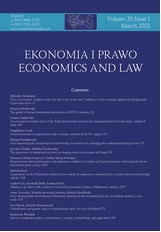Inclusion in the implementation of public policy: the Polish experience
Inclusion in the implementation of public policy: the Polish experience
Author(s): Mariusz CzupichSubject(s): Civil Society, Governance, Government/Political systems, Economic development, Fiscal Politics / Budgeting, Socio-Economic Research
Published by: Wydawnictwo Naukowe Uniwersytetu Mikołaja Kopernika
Keywords: inclusive growth; social participation; public policy; open government;
Summary/Abstract: Motivation: The concept of inclusive growth is considered as an instrument used to reduce many of today’s developmental inequalities. It assumes, on the one hand, a reduction in the disparities in the level of income of society, and, on the other hand, the desire to increase the standard of living. The latter aspect is particularly important in the socio-economic development policy at the regional and local levels. This is due to the possibility of participation and thus the impact of citizens on many dimensions of well-being, such as, health, safety or education. New public policy models provide such opportunities. They assume the involvement of a wide range of non-governmental actors in the planning and implementation of joint development activities. Aim: The purpose of the article is to identify instruments for implementing the concept of inclusive growth in Poland. Particular emphasis was placed on social participation in the process of making public decisions in cities. Results: Polish cities have been implementing the New Governance principles for over a dozen years, especially those regarding broad socialization of development policy. Examples include revitalization programs, hackathons and civic budgets, which create extensive opportunities for external entities to participate in public decision-making. Despite the fact that they show many limitations related to low attendance and social activity, they are treated as instruments for recognizing social needs and meeting them better. In this context, they are consistent with the demands of the inclusive growth concept.
Journal: Ekonomia i Prawo. Economics and Law
- Issue Year: 19/2020
- Issue No: 4
- Page Range: 639-656
- Page Count: 18
- Language: English

